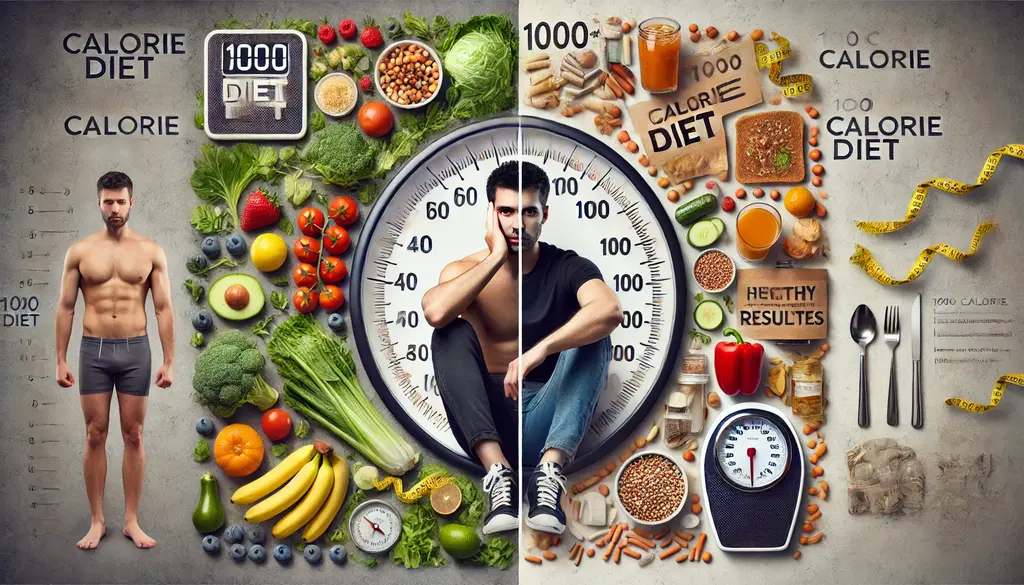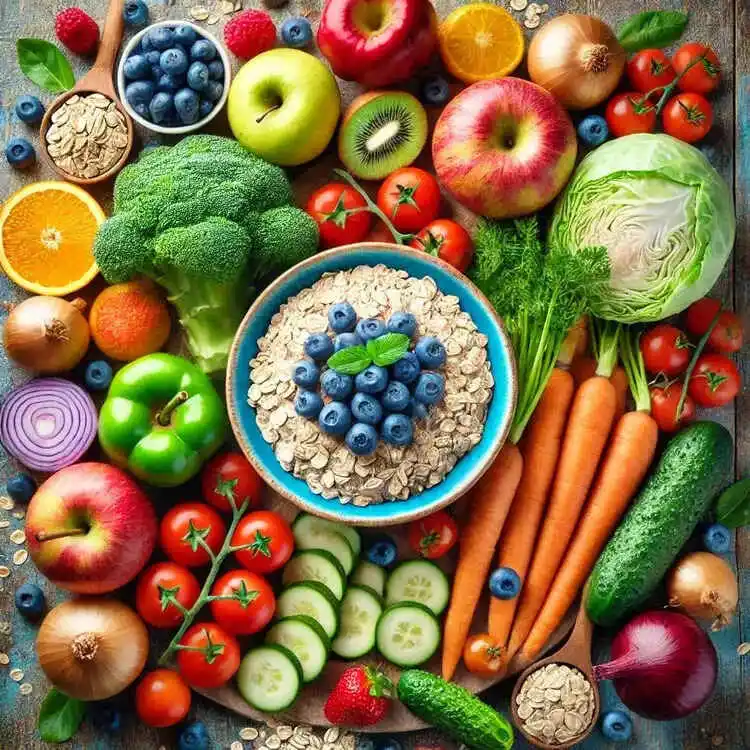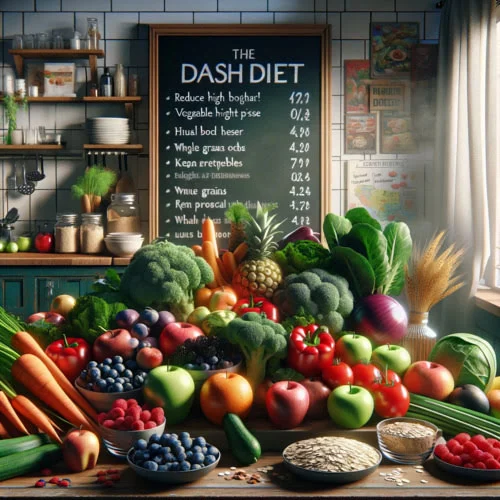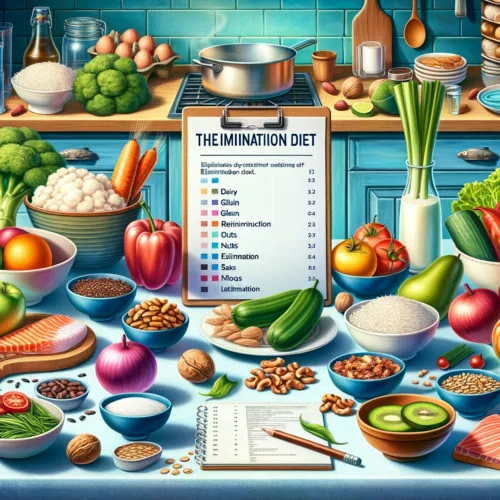The 1000-calorie diet is a strict low-calorie diet aimed at significant weight loss in a short period. It involves consuming only 1000 calories per day, which is substantially less than the usual daily requirement for most people. The main principle of this diet is creating a calorie deficit, which stimulates the body to use stored fat reserves for energy, aiding in weight loss.
Since the diet is restricted, it is important to carefully select foods to ensure balanced nutrition and avoid deficiencies in vitamins and minerals. The diet often includes low-fat protein sources, vegetables, fruits, and whole grains to maintain health and provide the body with necessary nutrients.
While the 1000-calorie diet can be effective for rapid weight loss, it is not suitable for long-term use and may cause side effects such as weakness, dizziness, and reduced energy levels. Therefore, it is crucial to follow specialist recommendations and consider individual body characteristics before starting this diet.
Advantages and Disadvantages of the Diet

Main Advantages of the Diet
The 1000-calorie diet has several significant advantages. First, its simplicity: it only requires calorie counting, making it accessible to many people. Second, it provides relatively quick results, which is especially motivating for those looking to lose weight rapidly. With such a strict calorie deficit, one can lose up to 5-6 kilograms in a month. Another advantage is the detoxification of the digestive system, which is especially beneficial after holiday overeating.
Additionally, this diet helps develop healthy eating habits as it requires careful selection of foods and balanced nutrition. With the right approach, the diet will include a large amount of vegetables, fruits, and low-fat proteins, contributing to overall health improvement.
Possible Disadvantages and Risks
Despite all the advantages, the 1000-calorie diet has significant disadvantages. The first and main drawback is the severe calorie restriction, which can lead to constant hunger, weakness, and low energy. This, in turn, can cause headaches, rapid fatigue, lack of concentration, and drowsiness.
This diet is especially dangerous for people with an active lifestyle and athletes, as it can lead to muscle mass loss and an increased risk of injuries and overtraining. It is also contraindicated for people with chronic diseases such as diabetes, cardiovascular diseases, and digestive problems.
Long-term adherence to such a strict diet can lead to exhaustion, nutrient deficiencies, and negative health consequences. Therefore, it is important to consult a doctor and consider all possible risks before starting a 1000-calorie diet.
Sample Menu for a Week
Following a 1000-calorie diet requires a balanced and varied menu to ensure the body gets all the necessary nutrients. Below is a sample menu for a week that will help you achieve your weight loss goals while adhering to healthy eating principles.
Monday
- Breakfast: Omelet made with two eggs, a crispbread, a slice of cheese, unsweetened tea or coffee
- Second Breakfast: Green apple
- Lunch: Baked turkey with stewed zucchini
- Afternoon Snack: Muesli bar
- Dinner: Cottage cheese casserole, kefir
Tuesday
- Breakfast: Oatmeal made with skimmed milk, unsweetened tea or coffee
- Second Breakfast: Banana
- Lunch: Vegetable soup, a slice of whole grain bread
- Afternoon Snack: Unsweetened yogurt
- Dinner: Fresh vegetable salad with canned tuna, tomato juice
Wednesday
- Breakfast: Two boiled eggs, toast with cheese, green tea
- Second Breakfast: Orange juice
- Lunch: Baked cod with rice
- Afternoon Snack: Green apple
- Dinner: Buckwheat, salad made with fresh cucumber and onion, tomato juice
Thursday
- Breakfast: Cottage cheese pancakes, green tea
- Second Breakfast: Kiwi
- Lunch: Risotto with shrimp or squid, tomato juice
- Afternoon Snack: Muesli bar
- Dinner: Stewed cabbage with chicken
Friday
- Breakfast: Yogurt with berries, unsweetened tea
- Second Breakfast: Pear
- Lunch: Steamed chicken breast with vegetables
- Afternoon Snack: Unsweetened kefir
- Dinner: Cottage cheese dessert with berries
Saturday
- Breakfast: Cottage cheese with honey, green tea
- Second Breakfast: Apple
- Lunch: Steamed fish with vegetables
- Afternoon Snack: Dried fruits
- Dinner: Fresh vegetable salad, chicken breast
Sunday
- Breakfast: Omelet with herbs, unsweetened tea
- Second Breakfast: Mandarin
- Lunch: Low-fat chicken soup
- Afternoon Snack: Nuts
- Dinner: Vegetable salad with tuna
This menu helps maintain a balanced diet that includes sufficient proteins, carbohydrates, and fats, and supports your weight loss goals. Be sure to count the calories of each dish and follow the recommended diet to achieve the best results.
Useful Tips

How to Properly Create a 1000 Calorie Diet
Creating a 1000 calorie diet requires careful planning to ensure the body receives all necessary nutrients despite the significant calorie restriction. Here are some tips to help you properly create such a diet:
- Macronutrient Balance: Your diet should include proteins, carbohydrates, and fats in the correct proportions. Proteins help maintain muscle mass, carbohydrates provide energy, and fats are essential for normal body functions.
- Focus on Low-Calorie, Nutrient-Dense Foods: Include vegetables, fruits, lean protein sources like chicken, fish, and cottage cheese, and whole grains. These foods are rich in vitamins and minerals but low in calories.
- Frequent, Small Meals: Eating 5-6 small meals a day helps maintain energy levels and prevents hunger.
- Avoid Empty Calories: Exclude sugar, sugary drinks, pastries, and fast food from your diet. They contain a lot of calories but few nutrients.
- Use Spices and Herbs: They help make food more flavorful without adding extra calories.
Importance of Calorie Counting and Regular Meals
Counting calories and maintaining a regular eating schedule are key to the success of a 1000 calorie diet:
- Calorie Control: Counting calories helps you accurately control the amount of energy consumed and avoid overeating. This is especially important on such a strict diet.
- Preventing Nutrient Deficiency: Careful accounting of calorie and nutrient intake ensures the body gets all necessary nutrients and avoids vitamin and mineral deficiencies.
- Regular Meals: Eating at the same time every day helps regulate metabolism and maintain stable energy levels. This reduces the risk of overeating and improves overall dietary discipline.
- Hunger Management: Frequent small meals help control hunger and prevent sharp blood sugar fluctuations, contributing to a stable state and increasing diet effectiveness.
Following these principles will help you successfully adhere to a 1000 calorie diet while maintaining health and achieving weight loss goals.
Contraindications

Who Should Avoid This Diet
The 1000 calorie diet has strict limitations and is not suitable for everyone. Before starting, it is necessary to consult a doctor and consider individual body characteristics. Here are the main categories of people who should avoid this diet:
- People with Chronic Diseases:
- Diabetes
- Cardiovascular diseases
- Gastrointestinal diseases such as ulcers and gastritis
- Pregnant and Nursing Women: During pregnancy and lactation, higher amounts of calories and nutrients are needed to maintain the health of the mother and child.
- Children and Adolescents: Growing bodies need a full and varied diet to ensure normal development and growth.
- Elderly People: Metabolism slows down with age, and the body’s nutrient needs increase, so strict restrictions can lead to deficiencies in necessary elements.
- People with High Physical Activity: Athletes and physically active people need more calories to maintain energy and endurance.
- People with Eating Disorders: A 1000 calorie diet can exacerbate eating problems, leading to further disturbances.
Possible Side Effects
Following a 1000-calorie diet can lead to several side effects due to insufficient calorie and nutrient intake:
- Weakness and Fatigue: Low calorie intake results in an energy deficit, leading to constant tiredness and weakness.
- Headaches: A lack of energy and nutrients can cause headaches and migraines.
- Dizziness and Fainting: A drastic reduction in calorie intake can cause blood sugar levels to drop, leading to dizziness and even fainting.
- Concentration Problems: Insufficient calories and nutrients can impair cognitive functions, causing distractions and concentration issues.
- Digestive Issues: Limited food intake can lead to constipation and other digestive problems.
- Mood Swings and Irritability: Low calorie and carbohydrate intake can negatively affect mood, causing irritability and depressive states.
- Muscle Mass Reduction: Without enough protein and calories, the body may start using muscle as an energy source, leading to muscle mass loss.
- Vitamin and Mineral Deficiency: A restricted diet may not provide all necessary vitamins and minerals, leading to various deficiencies and overall health deterioration.
These side effects underscore the importance of careful diet planning and consulting a doctor before starting a 1000-calorie diet.
How to Transition Out of the Diet

Gradual Calorie Increase
Properly transitioning out of a 1000-calorie diet is as important as the diet itself. Gradually increasing calorie intake is necessary to avoid rapid weight gain and to adapt the body to a new regimen. Here are some steps for gradually increasing calorie intake:
- Increase Calorie Intake by 200-300 Calories per Week: Gradually add more calories to your diet to allow your body to adapt without stress. For example, if you finish a 1000-calorie diet, consume 1200 calories per day the next week, then 1500 calories, and so on.
- Add Healthy Foods: Include foods rich in proteins, healthy fats, and complex carbohydrates. These can be nuts, seeds, avocados, whole grains, and low-fat dairy products.
- Increase Portion Sizes: Gradually increase portion sizes of main meals and add small snacks between meals.
- Continue Calorie Control: Despite gradually increasing calories, keep monitoring your food’s calorie content to avoid overeating and rapid weight gain.
Maintaining Achieved Results
Maintaining achieved results after completing the diet requires discipline and continuing a healthy lifestyle. Here are some tips to help maintain weight and health:
- Regular Physical Activity: Physical activity helps maintain metabolism and control weight. Include regular workouts such as cardio, strength exercises, or yoga in your daily routine.
- Balanced Diet: Continue following the principles of a balanced diet. Include a variety of foods in your diet to provide the body with all necessary nutrients.
- Portion Control: Even after completing the diet, monitor portion sizes to avoid overeating.
- Hydration: Drink enough water every day. This helps maintain metabolism and overall health.
- Regular Meals: Try to eat at the same time every day. This helps regulate blood sugar levels and prevent hunger.
Properly transitioning out of the diet and following these recommendations will help maintain achieved results and support long-term health.
Conclusion
The 1000-calorie diet is an effective way for quick weight loss, but its strictness requires careful planning and following specialist recommendations. The main advantages of the diet include its simplicity and the ability to achieve significant results in a short period. However, it is important to remember the potential risks such as weakness, dizziness, nutrient deficiencies, and muscle mass loss.
To successfully follow the diet, it is essential to carefully select foods, ensuring balanced nutrition, and maintain a frequent small meal regimen. Calorie control and regular meals help avoid sharp blood sugar fluctuations and maintain stable energy levels.
After completing the diet, gradually increase calorie intake to avoid rapid weight gain and adapt the body to a new calorie level. Maintaining achieved results requires continuing a healthy lifestyle, including regular physical activity, balanced diet, and portion control.
In conclusion, the 1000-calorie diet can be a useful tool for those looking to lose weight quickly but requires a cautious approach and individual adaptation. Consulting a doctor before starting the diet is recommended to consider all possible risks and body characteristics. Following these recommendations will help you achieve your weight loss goals and maintain achieved results in the long term.














